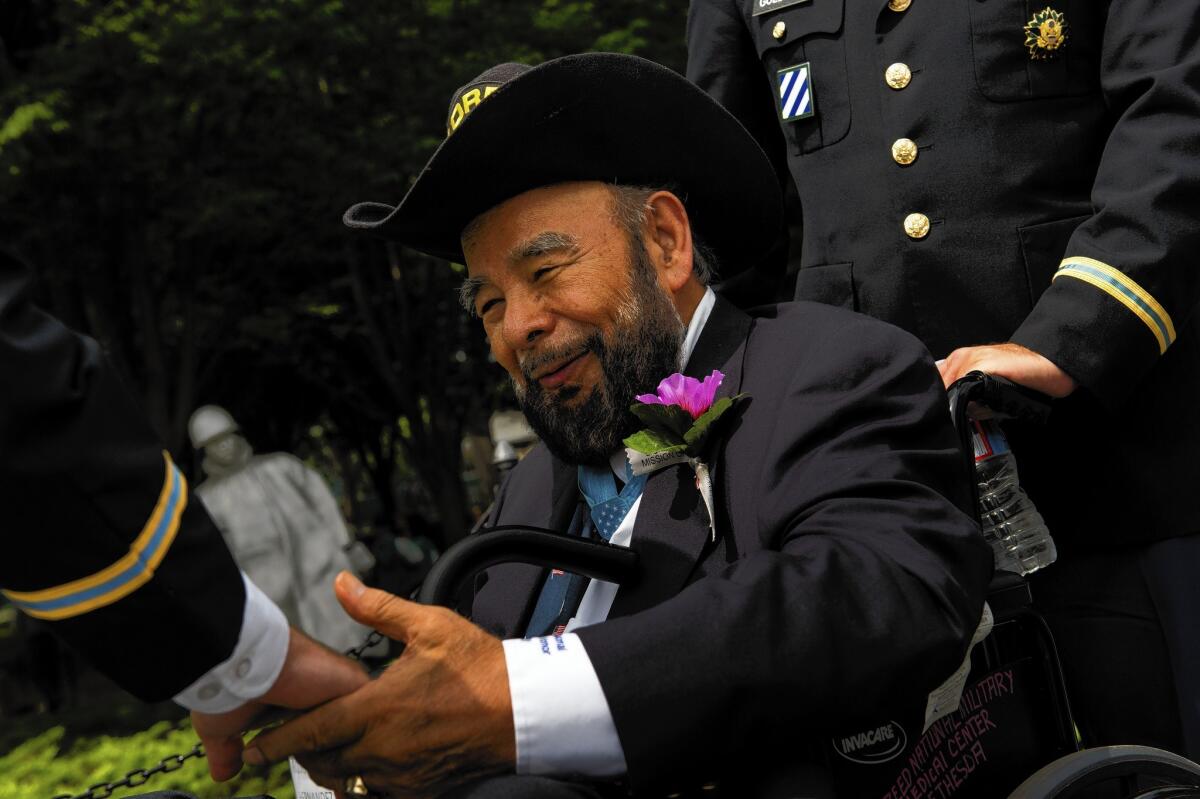Cpl. Rudy Hernandez dies at 82; Medal of Honor recipient

- Share via
Cpl. Rudy Hernandez, a son of California migrant workers who fought in the Korean War and was awarded the Medal of Honor in 1952, died Saturday at Womack Army Medical Center in Fayetteville, N.C.. He was 82 and had been diagnosed recently with cancer and other ailments.
Hernandez, a fixture at Fayetteville veterans events, was grand marshal of the city’s Veterans Day Parade last month. In August, Fort Bragg’s Warrior Transition Battalion Complex was rededicated in his name.
It was just after 2 a.m. on May 31, 1951, when Cpl. Hernandez felt the warm trickle of blood from a shrapnel wound on his head.
Hernandez and other soldiers of Company G, 187th Airborne Regimental Combat Team were holding defensive positions on a hill near the Korean town of Wontong-mi, during a North Korean assault.
From their foxhole, Hernandez and another soldier watched as the enemy approached and the night erupted in artillery, mortar and machine-gun fire.
As the rest of his platoon retreated after nearly exhausting their ammunition, Hernandez and his foxhole mate held their position and kept firing.
When he finally did leave the foxhole, Hernandez charged the enemy armed only with a grenade and a rifle with a fixed bayonet.
His bravery stopped the enemy advance and spurred his fellow soldiers to counterattack.
According to his Medal of Honor citation “The indomitable fighting spirit, outstanding courage and tenacious devotion to duty clearly demonstrated by Corporal Hernandez reflect the highest credit on himself, the infantry, and the United States Army.”
The morning after the attack, Hernandez was presumed dead after being found lying among the bodies of six North Korean soldiers who had been killed.
When a soldier saw a slight movement of Hernandez’s hand, medics began frantically trying to save his life.
A month later, Hernandez would wake up in a South Korean hospital.
Eight weeks later, he was sent to Letterman Hospital in San Francisco where doctors replaced part of his skull.
Hernandez couldn’t talk for months after he was injured and had to learn to walk again. Part of his body remained paralyzed.
Hernandez was awarded the Medal of Honor in April 1952 by President Truman in a ceremony held in the White House Rose Garden.
Rodolpho P. Hernandez was born April 14, 1931, in Colton. When he was 17, his parents allowed him to enlist in the Army.
After the war he worked as a veterans benefit counselor in Los Angeles and moved to Fayetteville in 1980.
Hernandez’s survivors include his wife, Denzil, and three children from an earlier marriage.
Speaking to the Fayetteville Observer in 1986, Hernandez said it was anger that drove him past the pain in Korea.
“I was just mad. It’s all I could think of. I was hurt bad and getting dizzy. I knew the doctors could not repair the damage. I thought I might as well end it now,” Hernandez said. “They gave the order to withdraw, but I didn’t. My gun jammed, so I stuck a bayonet in my rifle and threw several grenades from my foxhole. Then I got up and ran out to meet the enemy.
“Every time I took a step blood rolled down my face. It was hard to see,” he said. “They said I killed six with my bayonet.”
More to Read
Start your day right
Sign up for Essential California for the L.A. Times biggest news, features and recommendations in your inbox six days a week.
You may occasionally receive promotional content from the Los Angeles Times.






